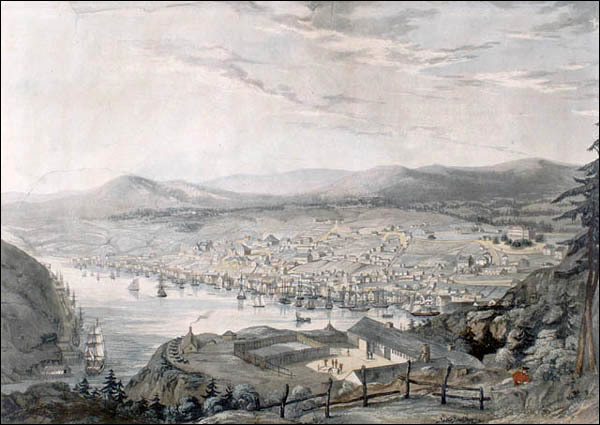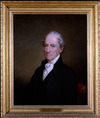- Responsible Government
- The Idea of Responsible Government in Lower and Upper Canada before 1839
- Lord Durham, His Report, and the Union (1839—42)
- Robert Baldwin and Sir Louis-Hippolyte La Fontaine
- The Baldwin—La Fontaine Ministry (1842—43)
- Continuing Debates in the Province of Canada (1843—48)
- The La Fontaine—Baldwin Ministry: The First Responsible Government of the Province of Canada (1848—51)
- Achieving Responsible Government Elsewhere in British North America
Newfoundland

Source: Link
Newfoundland’s reform tradition originated with the call for representative government. Granted by Great Britain in 1832, it took shape in a society often divided on the basis of class, religion, and region, to say nothing of politics. In the 1830s William CARSON, a Scottish physician and politician, was, with Patrick MORRIS, the leading reformer:
“Carson was a parliamentary purist, a determined defender of the rights and privileges of the house against real or imagined incursions of the Council, the governor, the Colonial Office, and private individuals. Although he was concerned with such matters as education, roads, and municipal reform, these did not engage him as much as constitutional nicety.…”
Peter BROWN was a successful Irish outport merchant who often broke away from Carson’s leadership. Although united on the principle of the legislature’s prerogatives, Brown and Carson disagreed on how power should be shared between the capital of St John’s and the outports:
“It was not until William Carson was returned in a by-election in December 1833 that the partisan divisions among members were revealed. Pack, Brown, and Power found themselves in a minority rump of reformers which included Carson and another St John’s member, John Kent*. These men were loosely united in their opposition to alleged unconstitutional exertions of executive power and violations of civil rights, and in their concern to assert the authority of the legislature. Brown tended to support Carson in debates on such issues. In February 1835, for example, he spoke in favour of Carson’s unsuccessful attempt to have a select committee of the house inquire into the administration of justice – really, an effort to undermine Chief Justice Henry John Boulton*. Brown’s speech on that occasion was careful and moderate. He does not appear to have been dominated by Carson, even during the period 1834–36. Indeed, on such issues as establishing a classical academy, imposing taxes, and increasing the number of representatives, Brown was perhaps Carson’s most persistent opponent. He feared what he described as the ‘preponderating influence’ of St John’s upon the assembly, and worried that outport interests were being overlooked in a number of measures that Carson supported. He was especially incensed over Carson’s favourite scheme to create an academy for, as Brown contemptuously phrased it, ‘the instruction of the opulent in the learned languages, in the richest town in the Island, whilst a common English School is denied to the poor people in the outports.’ This theme of neglect of the outharbours became more marked in his speeches as years passed.”
As in other colonies, journalists played critical roles in political debates and the shaping of public opinion. Robert John PARSONS was a tireless, uncompromising champion of reform and opposed the Amalgamated Legislature established in 1842, largely because it did “not embody the principle of responsible government”:
“A controversialist, a violent partisan, and at times a political opportunist, Parsons stood out in the most turbulent years of Newfoundland’s political history. From his entry into politics, he devoted all his talents to the goal of securing for Newfoundlanders the right to administer their own affairs freely. The ‘grand radical principle’ of responsible government was his guiding star and the special status of the native Newfoundlander his secondary beacon. These alone determined his course. In so far as the Roman Catholic clergy supported the principle of responsible government, he supported them; in so far as they threatened the native Newfoundlanders, he opposed them. When the merchant class opposed responsible government, he opposed them; when they represented the native Newfoundlanders, he supported them.
“Furthermore, and this was his great contribution, he produced an exciting newspaper that reflected the character of its editor. Parsons indeed lived up to the statement of the principles governing the policies of the paper that appeared beneath the masthead: ‘Here shall the press the people’s rights maintain, unawed by influence and unbribed by gain, Here Patriot truth her glorious precepts draw, pledged to religion, liberty, and law.’”
To learn more about reform politics in Newfoundland, consult the following biographies.





